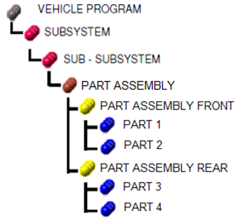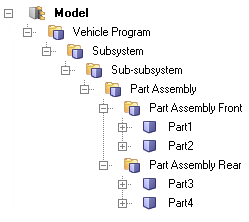About Parts, Part Assemblies, Part Instances
A part is an engineering representation of a physical part, and a part assembly is a group of part assemblies and/or parts. Part Instances, which are recognized from PDM, are automatically converted to Part Instances on import into HyperMesh.
Parts and Part Assemblies
HyperMesh supports CAE parts ( ![]() ) and
part assemblies (
) and
part assemblies ( ![]() ) and
PDM parts (
) and
PDM parts (![]() ) and
part assemblies (
) and
part assemblies ( ![]() ).
).
 |
 |
If a part is comprised of multiple components, such as cast parts or tailor-welded blanks, you can perform actions such as visualization view modes, model management, and connector link definition at the part level.
Parts can be used to organize a physical part that is made up of multiple components in a CAE model as a single part.

In the Part Browser, collapsing all folders at the part level enables you to see all owned and referenced entities. Expanding folders at the part level displays a nested list of all referenced components and their entity specific attribute values which are shown in the respective columns.
Part Instances
The Part browser provides limited support for part instances of externally sourced BOMs.
Part Instances (![]() )
share UID and Part names. The name assigned to child instances is incremented by
*.ixx, where xx indicates the number
of the child instance. The positioning of Part Instances is dictated by the
transformation matrix applied to the Part in the PDM system. Part Instances can also
be created and broken interactively in a session. Upon creation, you will
automatically be prompted to transform the part via the Transform tool. When broken,
instances are split into two separate parts that are independent of each other.
)
share UID and Part names. The name assigned to child instances is incremented by
*.ixx, where xx indicates the number
of the child instance. The positioning of Part Instances is dictated by the
transformation matrix applied to the Part in the PDM system. Part Instances can also
be created and broken interactively in a session. Upon creation, you will
automatically be prompted to transform the part via the Transform tool. When broken,
instances are split into two separate parts that are independent of each other.
In circular, symmetric, or rectangular patterns, certain parts may appear in a BOM multiple times. Typical examples include bolts, hinges, and symmetric parts.
Creating or saving part representations for instantiated parts saves a single representation in the repository. Importing instantiated parts positions them according to their respective 4 x 3 transformation matrices.